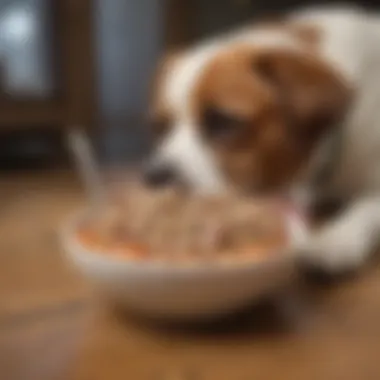Nourishing Foods to Relieve Diarrhea in Dogs


Intro
Dogs, like humans, can experience digestive issues from time to time. When your furry companion suffers from diarrhea, it’s important to act quickly and carefully. Not all foods are created equal during these distressing moments, and choosing the right diet can set the stage for a swift recovery. This guide dives into the specific dietary options that can support dogs going through such gastrointestinal turmoil. Understanding how different foods work, along with preparation tips and further care recommendations, can empower pet owners to help their pets feel better faster.
Understanding Your Pet
When a dog is unwell, it can help to consider its individuality. Every pooch has its own needs, and understanding these can be key to successful recovery.
Breed Traits
Certain breeds may be more prone to digestive problems than others. For instance, small breeds like Chihuahuas and Yorkshire Terriers often have sensitive stomachs. Conversely, larger breeds such as Great Danes can be more resilient, but they too can experience digestive upset. Knowing the traits of your dog’s breed can provide insights into its unique nutritional requirements during recovery.
Common Temperaments
Each dog has a distinct temperament that can affect its eating habits. While some dogs may timidly turn away from food when feeling sick, others might approach their bowl with vigor even when they shouldn't. Pay close attention to how your dog reacts during episodes of diarrhea; offering smaller portions might be more effective for those less inclined to eat.
Special Needs
From allergies to age-related issues, some pups may have specific dietary needs that must be considered. For example, senior dogs or those with known food sensitivities may require tailored diets to soothe their digestive system while ensuring their overall health remains intact.
Nutrition and Feeding Guidelines
Nutritional choices are paramount when dealing with puppy woes like diarrhea.
Recommended Foods
- Boiled Chicken: Plain, skinless chicken can be gentle on a dog's stomach while providing necessary protein.
- Rice: White rice is often recommended for its binding properties. It helps firm up stools and is easily digestible.
- Pumpkin: Not just for pies, plain pumpkin is a rich source of fiber that can soothe the digestive tract.
- Sweet Potatoes: These are nutritious and also rich in fiber, making them a good addition to a bland diet.
Note: Always introduce any new food gradually, ensuring it combines well with what your dog already eats.
Portion Control
When it comes to feeding a dog with diarrhea, less can be more. Smaller portions are recommended to avoid overwhelming the digestive system. It might be wise to feed your dog several smaller meals throughout the day instead of one or two larger ones.
Health and Wellness
Beyond diet, keeping an eye on your dog’s overall health is crucial. Ensure your dog stays hydrated, as diarrhea can lead to dehydration quickly. If you find your dog lethargic or showing other concerning symptoms, it may be time to reach out to your veterinarian.
End
Navigating dietary choices for dogs in distress isn’t a straightforward path, but it can lead to a very positive outcome when done thoughtfully. Understanding your dog's breed traits, temperament, and any special needs can guide you in selecting the best foods that foster digestive health. Pairing appropriate food options with portion control and overall wellness checks creates a well-rounded plan. As always, when in doubt, consulting a veterinarian will provide additional guidance tailored to your pup.
Prelude to Canine Digestive Health
Understanding canine digestive health is foundational for every dog owner, especially when facing issues like diarrhea. A healthy digestive system is crucial, acting as the body's engine for processing nutrients, absorbing vitamins, and ensuring overall well-being. Dogs, like humans, can experience gastrointestinal issues for a variety of reasons, and when these arise, prompt attention to their diet can prove invaluable.
Understanding Diarrhea in Dogs
Diarrhea is not just an inconvenience; it's the body's way of signaling distress. The first thing to recognize is that diarrhea can range from mild to severe. For our furry friends, it often presents as loose, watery stools that can lead to dehydration if not scaled back. There are many textures and colors that stools can take on, and recognizing these changes is crucial for pet owners. A quick response by altering diet can significantly aid in recovery, making it a critical point of focus.
While the discomfort of diarrhea is easily seen, underlying causes vary widely. From an unexpected snack of spoiled food to infections or allergies, each dog's case can differ immensely. Pet owners should be observant, noting how long the diarrhea lasts and accompanying symptoms like vomiting or decreased appetite. An understanding of these nuances lays the groundwork for managing canine digestive health effectively.
Common Causes of Diarrhea
The reasons behind a dog’s diarrhea can be as diverse as the breeds themselves. Here are several common triggers:


- Dietary indiscretion: Sometimes, a pup gets into the garbage or eats something outside that doesn't agree with them.
- Allergies or intolerances: Just like people, dogs can have food allergies or intolerances, which may upset their stomachs.
- Infections: Both viral and bacterial infections can result in diarrhea, often accompanied by other symptoms like fever and lethargy.
- Medication reactions: Certain medications can upset digestion, leading to temporary gastrointestinal distress.
Recognizing these causes not only helps in immediate management but also informs future dietary decisions for your dog. Adjusting food choices, paired with understanding their health needs can guide you in providing a balanced diet that minimizes the risk of diarrhea.
The Role of Diet in Managing Diarrhea
Managing diarrhea in dogs involves more than just providing comfort and care. A proper diet plays a crucial role during these times of distress. The body of a dog needs the right nutrients to help restore its gut health and maintain general well-being. Utilizing an appropriate diet can mitigate the symptoms and hasten recovery, so understanding the relationship between food and canine digestion becomes paramount.
First and foremost, the right diet can alleviate the immediate symptoms of diarrhea. Foods that are bland and easy to digest help reduce the burden on the gastrointestinal tract while offering essential nourishment. This is particularly important, as dogs lose not just fluids but also key nutrients during bouts of diarrhea. By providing thoughtful dietary choices, you support their recovery and ensure they regain their strength.
In addition to addressing existing symptoms, an appropriate diet can prevent future episodes of gastrointestinal distress. Concentrating on foods packed with soluble fibers, easily digestible proteins, and necessary vitamins can fortify the digestive system. It’s like they say, “an ounce of prevention is worth a pound of cure.”
How Food Affects Canine Digestion
Canine digestion is a complex process influenced heavily by the types of foods consumed. Dogs, being inherently carnivorous, thrive on diets that align closely with their evolutionary instincts. However, when faced with an episode of diarrhea, this natural predisposition often needs to be tempered with easier-to-digest options. Foods like plain rice or boiled chicken can work wonders.
The reason for this is that these foods are low in fiber and fat, thus allowing the gastrointestinal system to absorb nutrients without added strain. If you think about it, it’s akin to easing off the gas pedal when driving through heavy traffic; you want to move smoothly without the sudden stops and starts that can cause disturbances.
Dogs may also benefit from probiotic-rich foods during digestive disturbances. Probiotics help to restore the natural balance of gut flora, which can be disrupted during episodes of diarrhea. Just as humans can benefit from yogurt, dogs have their own alternatives. Each time you introduce these foods, it’s like sending in support troops to a beleaguered frontline, presenting a chance for a swift recovery by reinforcing the good bacteria that may have been diminished.
Nutritional Requirements During Diarrhea
During any instance of diarrhea, a dog's nutritional requirements shift considerably. Hydration becomes the cornerstone of recovery. Increased fluid loss can quickly lead to dehydration, which in dogs is a serious concern. Thus, water or an electrolyte solution should be accessible at all times.
As for food, the ideal diet for dogs in this situation needs to provide:
- Easily Digestible Carbohydrates: Options like plain white rice or oatmeal will keep energy levels up without burdening digestion.
- Lean Protein Sources: Foods like boiled chicken or turkey can give essential amino acids without the heaviness of fats.
- Fiber: Soluble fibers from pumpkin or sweet potatoes can help regulate bowel movements effectively, making them invaluable additions.
It’s also important to avoid any sudden changes to their regular diet. Introducing new foods too quickly can create more turmoil in a sensitive stomach. Be gradual, as gradual is often the name of the game in this scenario.
In summary, a thoughtful approach to diet during episodes of diarrhea goes beyond mere sustenance. It's about providing nutritious choices that promote healing and support overall digestive health. Taking the time to understand and implement such dietary changes can prevent further distress and foster a quicker return to health for your canine companion.
Recommended Foods for Dogs with Diarrhea
Dogs can face a multitude of digestive challenges, and diarrhea is among the more common issues that pet owners confront. The food that a dog consumes plays a critical role in both exacerbating and alleviating digestive upset. Therefore, understanding what to feed a dog with diarrhea can be pivotal in aiding recovery and restoring balance to their gastrointestinal system.
Feeding dogs certain foods during bouts of diarrhea can help firm up stools, replenish lost nutrients, and provide hydration, which is essential since diarrhea can lead to dehydration fairly quickly. It becomes crucial for the dog owner to make informed choices; not all foods are suitable during these trying times. Ultimately, offering the right mix of easily digestible and nourishing foods can support the healing process and prevent unnecessary distress.
Plain Rice and Its Benefits
When your pup is dealing with diarrhea, plain rice is often the first recommendation from vets. It’s easy on a dog’s stomach, light, and a good source of carbohydrates. White rice can act as a binding agent, meaning it can help firm up those loose stools.
Apart from being easy to digest, rice is also beneficial because:
- It can provide a quick energy source.
- It helps to thicken stools, promoting a regular bathroom routine.
- It's typically a food most dogs enjoy, making it easier to encourage them to eat during a time when they may feel unwell.
Try cooking the rice until it's well done without adding any seasoning. It’s important to maintain simplicity in these dishes.
Boiled Chicken: A Gentle Protein Source
Another option that ranks high on the list is boiled chicken. This lean protein can provide vital nutrition without overstressing a dog's digestive system. Boiled chicken is both tempting and gentle, making it easier for dogs to eat. Ideal preparation involves cooking the chicken thoroughly and then shredding it into small, manageable pieces.
The benefits of adding boiled chicken include:
- Low fat content, which minimizes irritation to the digestive tract.
- The ability to accommodate picky eaters, encouraging food intake when it's needed most.
- It’s packed with protein essential for recovery from any illness or stress.
Pumpkin: A Natural Digestive Aid


Most people think of pumpkin as just a fall flavor, but for dogs with diarrhea, it’s a treasure trove of benefits. Plain, canned pumpkin (not the spiced kind) is a natural source of fiber, which can aid in regulating your dog’s digestion.
How pumpkin helps:
- Adds bulk to stools, helping in both cases of diarrhea and constipation.
- Rich in vitamins and minerals which can help in overall health.
- Hydration is an added bonus as pumpkin has high water content.
It's advisable to start with a small amount and see how your dog responds; in most cases, they will take to pumpkin quite well.
Sweet Potatoes and Their Nutritional Profile
Next on the list are sweet potatoes. This root vegetable is not just a comfort food; for dogs, it can be a miracle worker. Sweet potatoes are rich in dietary fiber, vitamins A and C, and provide a wholesome addition to a dog’s diet, especially during bouts of diarrhea.
Highlights of sweet potatoes:
- They help firm up stool while providing nutrients to support recovery.
- Easy to prepare by boiling or baking, then mashing or cutting into small pieces.
- Often considered appealing by most canine taste buds.
Plain Yogurt: Probiotic Benefits
Plain yogurt (with no artificial sweeteners) works as a beneficial addition for dogs recovering from diarrhea. It contains live cultures, often referred to as probiotics, which can assist in restoring the natural balance of gut bacteria.
Notable benefits of yogurt:
- Supports digestive health by introducing a healthy level of bacteria.
- Can enhance nutrient absorption.
- Offers a good source of calcium and protein.
Keep in mind that not all dogs tolerate dairy; therefore, it's important to start with a small serving.
Bone Broth: Hydration and Nutrients
Lastly, bone broth serves as a superb choice for dogs battling diarrhea. It’s rich in nutrients and can also help keep your furry friend hydrated, which is essential during times of digestive distress. Not only does it taste great for dogs, but it's easy to make at home.
Why bone broth is beneficial:
- Nutrient dense, providing essential vitamins and minerals.
- Acts as an excellent base for introducing other foods.
- Helps to rehydrate a dog who may be losing fluids due to diarrhea.
For optimal benefits, homemade bone broth is preferable, as it allows you to control the ingredients and avoid additives that could aggravate the dog’s digestion.
Preparation and Serving Guidelines
When it comes to nursing a dog back to health after experiencing diarrhea, preparation and serving techniques play a pivotal role in the overall success of dietary interventions. Properly preparing food ensures that dogs not only receive the nutrients they need but also that their digestive systems are gently taken care of. Careful consideration of how meals are cooked and served can ease a dog’s recovery process while ensuring they are comfortable and nourished.
Cooking Techniques for Optimal Nutrition
Cooking methods can make a world of difference in nutrient absorption. Here are a few things to keep in mind:
- Steaming or Boiling: Both are excellent techniques that preserve nutrients while keeping the food easy to digest. For example, a simple boiled sweet potato is soft and mushy enough for a recovering dog’s distressed stomach.
- Avoiding Heavy Fats: When preparing meals, it’s crucial to steer clear of fatty oils or rich sauces. Stick to plain, unseasoned food. Dogs do not need condiments, and fats can complicate an already upset digestive system.
- Blending for Texture: Sometimes, chopping food into smaller pieces or blending can help with digestion. A smoothie-like mixture of boiled rice and boiled chicken might make it appealing and easier for a dog to consume when it's not feeling well.
It’s important to remember that low-fiber vegetable options are often better for dogs with diarrhea. In doing this, the food should be soft and easily manageable, while avoiding ingredients that can cause further digestion issues.
Portion Control and Feeding Frequency
Once the food is prepared, serving it properly is just as essential as how it’s made. Instead of offering a large meal at once, consider these beneficial strategies:
- Small, Frequent Meals: Serving smaller portions more frequently throughout the day can help a dog’s digestive system manage better. When a dog has diarrhea, its digestive system is in a fragile state, hence the need for smaller, lighter meals. Typically, two to three small meals a day is advisable.
- Gradual Reintroduction to Regular Diet: After a couple of days of keeping meals light, as symptoms improve, you can start mixing in regular food. However, it's advisable to do this gradually—mixing a bit of regular kibble into the bland diet can help transition the dog back to its usual eating habits.
- Staying Hydrated: Always have plenty of fresh water readily available. Hydration is key when a dog is recovering from diarrhea. Consider offering ice chips or electrolyte solutions designed for pets if your dog is hesitant to drink fluids directly.
Adhering to these guidelines not only assists in swift recovery but also nurtures your pet’s comfort and stability during a tough time. Keeping meals simple and ensuring that the dog stays hydrated paves the way for an overall positive outcome.


Signs That Require Veterinary Attention
Recognizing when a dog's diarrhea needs professional veterinary input is crucial for both the pet and the owner. Diarrhea, albeit common and often manageable at home, can sometimes signal a more serious underlying issue. Ignoring certain signs can worsen your dog's condition or lead to complications, which is why staying alert to these indicators is vital.
When Diarrhea Becomes Severe
Severe diarrhea in dogs is more than just an inconvenience; it's a serious health concern. It's often defined by factors such as frequency, consistency, and accompanying symptoms.
- Frequent Bouts: If your dog is having multiple episodes of diarrhea in a day, it can quickly lead to dehydration. A dog can lose a significant amount of water and electrolytes just like that.
- Blood in Stool: Any visible blood—bright red or dark and tarry—should raise red flags. Blood signifies potential injuries within the digestive system or infections, and immediate veterinary attention is warranted.
- Painful Symptoms: Watch for signs of discomfort, like excessive whining, pacing, or straining. If your dog seems uneasy, it might indicate more significant issues engendering their digestive upset.
- Duration: Diarrhea that lasts more than a day or two without improvement means it’s time to consult a vet. Persistent diarrhea can lead to malnourishment and dehydration very fast.
When in doubt, always err on the side of caution. As they say, better safe than sorry.
Recognizing Other Symptoms
Sometimes, diarrhea is just one piece of the puzzle. As a conscientious pet owner, it’s essential to monitor additional symptoms that could accompany digestive disturbances:
- Vomiting: If your dog is both vomiting and experiencing diarrhea, that’s a double whammy. This combo often points to a more severe problem, perhaps even an infection or a dietary indiscretion.
- Lethargy: If your furry friend seems more tired than usual or less interested in playtime, it may indicate that their body is dealing with stress, possibly due to illness.
- Appetite Changes: Notice if your dog seems to have lost their usual enthusiasm for mealtime. A sudden drop in appetite can be a warning sign that something is off.
- Fever: A high temperature can indicate an underlying health issue. If your dog feels excessively warm to the touch, checking their temperature may be prudent. Normal canine body temperature ranges from 100.5°F to 102.5°F (38.1°C to 39.2°C).
"A dog’s intuition regarding their health is often spot-on. Trust your gut when something seems off."
If you observe multiple concerning symptoms alongside diarrhea, don’t hesitate to contact your veterinarian. Early intervention can make a significant difference in your dog's recovery and overall well-being.
Alternative Treatments and Supplements
When it comes to managing diarrhea in dogs, food plays a pivotal role. However, there is more to the equation than just diet. Alternative treatments and supplements can complement traditional approaches, enhancing recovery and promoting overall gut health. Understanding how these methods work and their potential benefits is important for any pet owner facing this common issue.
These alternatives include probiotics and herbal remedies, both of which have gained traction among pet owners. Probiotics are live microorganisms that, when administered in adequate amounts, confer health benefits by improving or restoring the gut flora. On the other hand, certain herbs have long been used in traditional medicine for their digestive-enhancing properties. Knowing how to incorporate these options can lead to better digestive health and quicker recoveries.
Probiotics and Their Effectiveness
When your dog is hit by a bout of diarrhea, their gut flora can get thrown out of balance. Enter probiotics, the unsung heroes of gut health. These beneficial bacteria help to restore the natural balance and can reduce the duration and severity of diarrhea. You may wonder why they are so effective. The simple answer lies in their ability to:
- Improve gut microbiota: Probiotics can replenish the good bacteria in a dog’s digestive system, which may be depleted during gastrointestinal distress.
- Enhance immune response: A well-balanced gut can support the immune system, helping your dog fight off potential infections or other health issues.
- Decrease inflammation: Many probiotics have anti-inflammatory properties, which can soothe an irritated digestive tract.
It is essential, though, to select the right probiotic for your dog. Not all probiotics are created equal, and species-specific strains tend to be more effective—look for products that mention canine strains or are made specifically for dogs. When choosing, consulting your veterinarian is often a wise course of action, ensuring that you pick something tailored to your dog's specific needs.
Herbal Remedies for Digestive Health
Herbs like ginger, peppermint, and fennel have been spicing up diets and soothing stomachs for centuries. They can play a role in doggie digestion too. A few points about these herbal remedies include:
- Ginger: Often celebrated for its ability to relieve nausea, ginger can also calm an upset stomach, making it a go-to for diarrhea management.
- Peppermint: This herb has a reputation for relaxing muscles, which can ease digestive tract spams that might accompany diarrhea.
- Fennel: Known for its carminative properties, fennel can help reduce gas and improve overall digestion.
However, caution is key when using herbs. Not all herbs are safe for canine consumption, and in some cases, large quantities can have adverse effects. Always check with a veterinarian before introducing any herbal remedy to your dog's diet, especially during recovery phases.
Finale
In wrapping up our discussion on dietary strategies to help dogs suffering from diarrhea, it is clear that careful consideration of food choices can make a significant difference. The emphasis on a gentle and easily digestible diet serves as the cornerstone for recovery. Nutrients are fundamental not just for recovery but also for a dog's ongoing health.
Summary of Dietary Strategies
The strategies discussed highlight the importance of a balanced diet that includes specific foods like plain rice, boiled chicken, pumpkin, and yogurt. Each of these options is chosen for its ability to provide binding agents or probiotics that soothe the digestive tract.
- Plain Rice: This starch helps bind stool and is widely recognized for its effectiveness.
- Boiled Chicken: Its protein content is mild yet nourishing, making it ideal during recovery.
- Pumpkin: High in fiber, it promotes healthy digestion and can aid in firming up loose stool.
- Plain Yogurt: A great source of probiotics, it helps restore gut flora which is essential during recovery.
Proper nutrition helps in managing your dog’s digestive health effectively and enhances their overall well-being.
Other strategies include portions control, providing smaller meals more frequently rather than a few large ones. This helps avoid overburdening the digestive system. It's also essential to avoid sudden dietary changes, as these can exacerbate gastrointestinal issues. Instead, gradually transitioning back to a regular diet can allow the dog’s system to readjust more smoothly.
Encouragement for Responsible Pet Care
Being a pet owner comes with the responsibility of understanding your dog’s needs. If a dog shows persistent diarrhea, it’s vital to consult a vet. Ignoring signs of dehydration or weight loss can lead to more severe health issues down the line.
Moreover, the relationship between diet and health cannot be overstressed. Owners should always be proactive about their dog’s diet, keeping an eye on any dietary intolerances or preferences. Regular check-ups can also assist in ensuring that food stays in line with health requirements.



